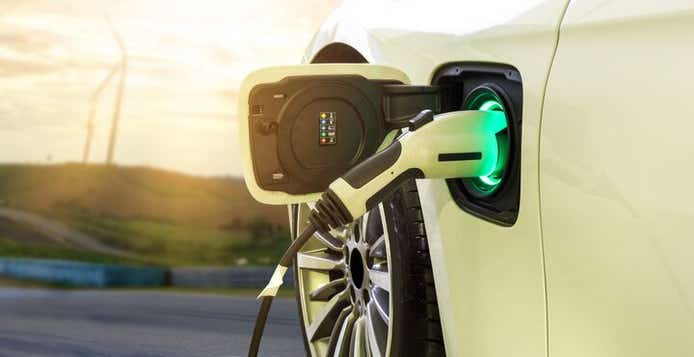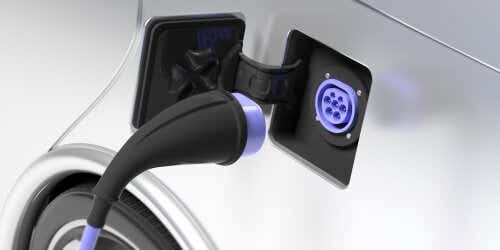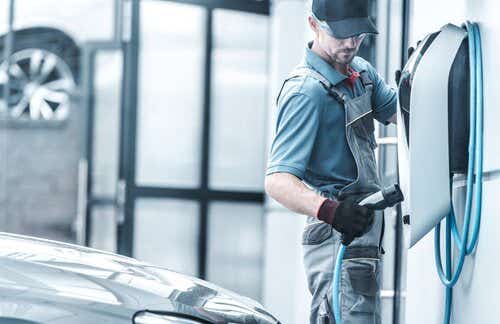What are the factors that affect an electric car’s charging speed?
There are several factors that will influence the time it takes an electric car to charge.
The size of the battery - the bigger the battery, the longer it will take to charge. Manufacturers may also promote the total battery size rather than the usable battery size. The usable size is the one to take note of, because that will be the battery’s maximum charging capacity.
How empty the battery is - the emptier the battery, the longer it will take to charge
The vehicle’s maximum charging rate - you can’t charge the vehicle any faster by using a charging point with a higher charging rate than the vehicle can accept. If the vehicle’s maximum charging rate is 50 kW, a 200 kW rate charger won’t charge it any faster than that 50 kW rate.
The charging point’s maximum charging rate - similarly, a charging point will only charge at its maximum rate, even if your vehicle can charge at a higher rate
The type of connector will also have an effect on an EV’s charging time. You can charge your car using a standard three-pin household plug, which will take a long time, or you can use a specific EV charging connector like a Type 2, which is designed to work with the car’s onboard charging system and will reduce the time it takes to charge.
All of these factors are variable, so there isn’t a one-size-fits-all answer to an EV charging speed question.
How long will my electric car take to charge at home?
The table below shows some examples of electric cars and their home charging times.
| Total battery size/usable battery size | Maximum car charging rate | Charger type | Charging time (empty to full) | |
|---|---|---|---|---|
| 35.5 kWh/28.5 kWh | 6.6 kW | Type 2 | 5 hours 15 mins | |
| 40 kWh/37 kWh | 6.6 kW | Type 2 | 6 hours 45 mins | |
| 54.7 kWh/52 kWh | 22 kW | Type 2 | 3 hours | |
| 60 kWh/57 kWh | 11 kW | Type 2 | 6 hours 15 mins | |
| 93.4 kWh/83.7 kWh | 11 kW | Type 2 | 9 hours | |
| 120 kWh/107.8 kWh | 11 kW | Type 2 | 11 hours 45 mins |
NB: The Porsche Taycan GTS and Mercedes EQS 450+ charging times assume the property has a 3-phase grid connection, which most homes do not possess. In that case, the maximum charging power will be 7.4 kW, allowing for a charge time of 13 hours 30 minutes for the Porsche and 17 hours 15 minutes for the Mercedes.
Figures taken from https://ev-database.uk/
In this table, we see how the four factors listed above come into play and help determine an electric car’s charging time. The quickest charger is the Renault, with a mid-to-low range battery size but a high charging rate. The Porsche and Mercedes have giant battery capacities, but effectively charging them requires a power infrastructure most homes can’t yet access - however, given their battery size and capacity to drive more miles, they may never need to charge fully.
This table may be useful as a guide, but always double-check the battery capacity and maximum charging rate with the manufacturer or dealer, who will be able to give you an accurate charging time estimate for the model you’re thinking of buying.
How long does it take to charge an electric car at a public charging station?
Most public charging stations offer average electric car charging times - their charging rate is usually 7 kW, which would offer up to 30 miles per hour of charging, though some offer 22 kW, which would offer up to 90 miles. As always, though, the times will vary depending on the car, battery capacity and onboard charging rate.
How long does it take to charge an electric car using rapid charging points?
Rapid charging is a direct current charging system usually available at service stations and other public charging points. It’s by far the quickest way to charge an EV battery, but the car has to be able to handle it. The Porsche Taycan GTS, which can’t really be charged effectively at home, has a maximum rapid charge power of 262 kW, which means it can be charged from 10% to 80% in about 20 minutes. Similarly, the Mercedes EQS 450+ has a maximum rapid charge power of 204 kW, so it can be charged from 10% to 80% in about 35 minutes.
You’ll only really be able to charge your car to about 80% using rapid charging - from that point, the charging rate slows down dramatically to protect battery cells.
How can top-up charging help with EV charging times?
It’s worth remembering that you don’t need to wait until you’re at home to charge your car. You can top up at public charging stations while you’re out in order to avoid range anxiety, and then make less use of your home charger when you’re at home, speeding up the time it takes to get to full charge.
Unsure if you need an EV home charger? Find the advice you need for the stage you're at here.

I'm considering buying an EV
If you're thinking about getting an EV, what do you need to consider when it comes to charging?

My EV is on the way
If you've ordered an EV, what do you need to do to prepare for its arrival?

I already have an EV
If you have an EV and you're considering installing a home charger, we can help advise you.
FAQs
Why does the car take longer to charge when it’s cold?
If you’re using a rapid charger, you may find that your car takes a bit longer to charge than usual. This is because extra power is needed to heat both the inside of the car and the battery, so it can take longer to charge.
How much does it cost to charge an electric car?
There isn’t a simple answer to the question of the cost of charging an electric car. It depends on several factors, including:
Whether it’s being charged at home or at a public charging point
If it’s being charged at home, which electricity tariff is it being charged on? Some make use of off-peak unit rates to charge EVs more cheaply, but unit rates are different throughout the country
If it’s being charged at a public charging point, is it a free one or a point you have to pay to use?
The amount of time it’s being charged for
Electric car manufacturers and dealers should be able to give you accurate estimates throughout the purchase process.




